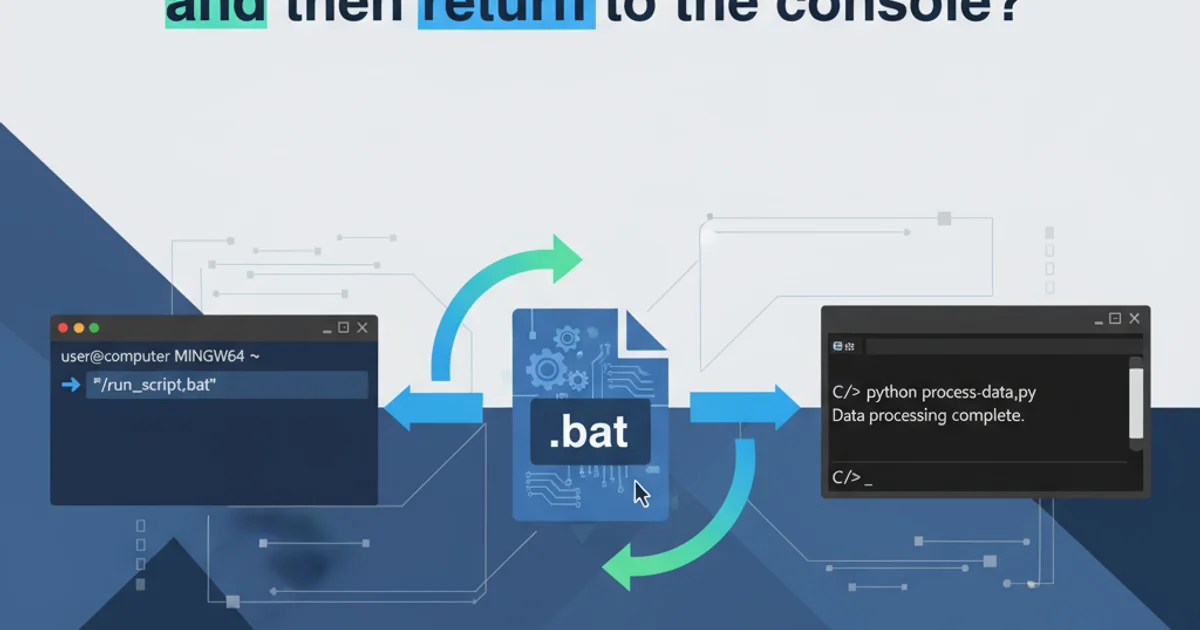How do I execute a .bat from git bash and then return to the console?
Categories:
Executing Batch Files from Git Bash and Returning to the Console

Learn how to seamlessly execute Windows batch files (.bat) from within Git Bash and ensure proper return to the Git Bash environment for continued command-line work.
Git Bash provides a powerful Linux-like command-line experience on Windows, but sometimes you need to interact with native Windows commands or execute .bat files. A common challenge is running a batch file and then having the Git Bash session automatically return to its prompt, rather than closing or getting stuck in the batch file's context. This article will guide you through the methods to achieve this, ensuring a smooth workflow between your Git Bash environment and Windows batch scripts.
Understanding the Challenge
When you execute a .bat file directly from Git Bash, Git Bash often treats it as an external process. Depending on how the batch file is invoked and what it contains, the Git Bash window might close, or the batch file might take over the current shell, preventing you from immediately typing new commands in Git Bash. This behavior stems from the different ways Windows cmd.exe and Git Bash (which uses MinGW/MSYS2) handle process execution and shell environments.
flowchart TD
A[Git Bash Session] --> B{Execute .bat file?}
B -->|Directly| C[New cmd.exe process]
C --> D{Batch file finishes}
D -->|cmd.exe closes| E[Git Bash returns (if cmd.exe was child process)]
D -->|cmd.exe stays open| F[Git Bash blocked/waiting]
B -->|Using 'start' or 'cmd /c'| G[New cmd.exe process (detached/temporary)]
G --> H[Batch file finishes]
H --> I[cmd.exe closes automatically]
I --> J[Git Bash returns immediately]
style C fill:#f9f,stroke:#333,stroke-width:2px
style G fill:#bbf,stroke:#333,stroke-width:2pxFlowchart illustrating different execution paths for batch files from Git Bash.
Method 1: Using cmd /c for Execution
The most reliable and recommended way to execute a .bat file from Git Bash and ensure a clean return is to explicitly invoke cmd.exe with the /c switch. The /c switch tells cmd.exe to execute the specified command and then terminate. This ensures that the batch file runs in its own temporary cmd.exe instance, which closes automatically upon completion, returning control to your Git Bash session.
cmd //c "C:\path\to\your\script.bat"
# Or, if the script is in the current directory:
cmd //c "./your_script.bat"
# Example with arguments:
cmd //c "C:\path\to\your\script.bat" arg1 "arg with spaces"
Executing a batch file using cmd //c from Git Bash.
//c. While cmd /c works in a standard Windows command prompt, Git Bash (MinGW) often requires //c to correctly interpret the /c switch for cmd.exe. This is a common quirk when mixing Windows commands with a Unix-like shell.Method 2: Using start Command (for detached execution)
The Windows start command can also be used to launch applications or scripts. When used with a .bat file, it typically opens a new cmd.exe window to run the script. This can be useful if you want the batch file to run in a separate, visible window without blocking your current Git Bash session. However, if the batch file itself has a pause command or waits for user input, that new window will remain open until dismissed.
start "" "C:\path\to\your\script.bat"
# The first empty double quote is for the window title, which is optional but good practice.
# Example with arguments:
start "My Batch Script" "C:\path\to\your\script.bat" arg1 arg2
Executing a batch file using start from Git Bash.
start will launch the batch file in a new cmd.exe window. Your Git Bash prompt will return immediately. This is ideal for background tasks or scripts that you want to monitor in a separate window without interrupting your current workflow.Handling Paths and Arguments
When passing paths and arguments, remember that Git Bash uses Unix-style paths (forward slashes), while Windows batch files expect Windows-style paths (backslashes). Git Bash often handles this translation automatically for simple cases, but explicit conversion might be needed for complex scenarios or when passing paths as arguments within the batch file. For arguments, ensure they are properly quoted if they contain spaces.
# Example: Passing a Git Bash path to a batch file
MY_GIT_BASH_PATH="/c/Users/MyUser/Documents/my_file.txt"
# The batch file might receive this as '/c/Users/MyUser/Documents/my_file.txt'
# If the batch file needs a Windows path, you might need to convert it inside the .bat or before calling.
# A simple conversion in Git Bash before calling:
WIN_PATH=$(cygpath -w "$MY_GIT_BASH_PATH")
cmd //c "C:\path\to\your\script.bat" "$WIN_PATH"
Converting Git Bash paths to Windows paths using cygpath.
cygpath -w to ensure the batch file receives a valid Windows path.1. Open Git Bash
Launch your Git Bash terminal.
2. Navigate to your .bat file (optional)
Use cd to change to the directory where your .bat file is located, or provide the full path in the next step.
3. Execute using cmd //c
Type cmd //c "./your_script.bat" (if in the same directory) or cmd //c "C:\path\to\your\script.bat" and press Enter. Your batch file will execute, and control will return to Git Bash.
4. Verify return to Git Bash
After the batch file finishes, you should see your Git Bash prompt ready for new commands.